- Clone
- W17010B (See other available formats)
- Regulatory Status
- RUO
- Other Names
- Interleukin 13
- Isotype
- Rat IgG1, κ
- Ave. Rating
- Submit a Review
- Product Citations
- publications
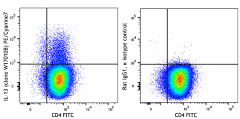
-

PMA+ionomycin-stimulated (6 hours, in the presence of brefeldin A) Th2-polarized BALB/c CD4-positive T cells were surface stained with anti-mouse CD4 FITC. Cell were fixed, permeablized, and intracellularly stained with anti-mouse IL-13 (clone W17010B) PE/Cyanine7 (left) or rat IgG1, κ PE/Cyanine7 isotype control (right).
| Cat # | Size | Price | Quantity Check Availability | Save | ||
|---|---|---|---|---|---|---|
| 159407 | 25 µg | £94 | ||||
| 159408 | 100 µg | £249 | ||||
Mouse IL-13 was initially cloned from cDNA libraries of activated T cells and was designated as P600. IL-13 is an immunoregulatory cytokine secreted predominantly by activated Th2 cells, and it is a key mediator in the pathogenesis of allergic inflammation. IL-13 shares many functional properties with IL-4, and they share a common receptor subunit, the alpha subunit of the IL-4 receptor (IL-4Ra). IL-13 mediates its effects by interacting with a complex receptor system comprised of IL-4Ra and two IL-13 binding proteins, IL-13Ralpha1 and IL-13Ralpha2. Ligation of the IL-13 receptor complex results in signaling via the insulin receptor substrate (IRS)-1 and 2 and STAT-6 pathways. IL-13 has been implicated in inflammatory responses, such as airway hypersensitivity and mucus hypersecretion, inflammatory bowel disease, and parasitic nematode expulsion.
Product DetailsProduct Details
- Verified Reactivity
- Mouse
- Antibody Type
- Monoclonal
- Host Species
- Rat
- Immunogen
- Recombinant mouse IL-13
- Formulation
- Phosphate-buffered solution, pH 7.2, containing 0.09% sodium azide.
- Preparation
- The antibody was purified by affinity chromatography and conjugated with PE/Cyanine7 under optimal conditions.
- Concentration
- 0.2 mg/mL
- Storage & Handling
- The antibody solution should be stored undiluted between 2°C and 8°C, and protected from prolonged exposure to light. Do not freeze.
- Application
-
ICFC – Quality tested
- Recommended Usage
-
Each lot of this antibody is quality control tested by intracellular immunofluorescent staining with flow cytometric analysis. For flow cytometric staining, the suggested use of this reagent is ≤ 0.25 µg per million cells in 100 µL volume. It is recommended that the reagent be titrated for optimal performance for each application.
- Excitation Laser
-
Blue Laser (488 nm)
Green Laser (532 nm)/Yellow-Green Laser (561 nm)
- RRID
-
AB_2927809 (BioLegend Cat. No. 159407)
AB_2927809 (BioLegend Cat. No. 159408)
Antigen Details
- Structure
- Cytokine
- Distribution
-
Th2 cells, basophils, mast cells, activated eosinophils and NK cells
- Function
- IL-13 modulates mouse monocytes/macrophages and B cells. IL-13 induces an increase of MHC class II expression in mouse monocytes/macrophages, and direct inhibition of inflammatory cytokines such as TNF-α and IL-1β.
- Ligand/Receptor
- IL-4Rα, IL-13Rα1, and IL-13Rα2
- Cell Type
- Basophils, Eosinophils, Mast cells, NK cells, Th2
- Biology Area
- Immunology
- Molecular Family
- Cytokines/Chemokines
- Antigen References
-
- Brown KD, et al. 1989. J Immunol. 142:679-87.
- McKenzie AN, et al. 1993. Proc Natl Acad Sci USA. 90:3735-9.
- McKenzie GJ, et al. 1999. J Exp Med. 189:1565-72.
- Gene ID
- 16163 View all products for this Gene ID
- UniProt
- View information about IL-13 on UniProt.org
Related Pages & Pathways
Pages
Related FAQs
Other Formats
View All IL-13 Reagents Request Custom Conjugation| Description | Clone | Applications |
|---|---|---|
| PE anti-mouse IL-13 | W17010B | ICFC |
| APC anti-mouse IL-13 | W17010B | ICFC |
| PE/Cyanine7 anti-mouse IL-13 | W17010B | ICFC |
| PerCP/Cyanine5.5 anti-mouse IL-13 | W17010B | ICFC |
| PE/Dazzle™ 594 anti-mouse IL-13 | W17010B | ICFC |
Customers Also Purchased
Compare Data Across All Formats
This data display is provided for general comparisons between formats.
Your actual data may vary due to variations in samples, target cells, instruments and their settings, staining conditions, and other factors.
If you need assistance with selecting the best format contact our expert technical support team.
-
PE anti-mouse IL-13

PMA+ionomycin-stimulated (6 hours, in the presence of brefel... -
APC anti-mouse IL-13

PMA+ionomycin-stimulated (6 hours, in the presence of brefel... -
PE/Cyanine7 anti-mouse IL-13

PMA+ionomycin-stimulated (6 hours, in the presence of brefel... -
PerCP/Cyanine5.5 anti-mouse IL-13

Cell Activation cocktail-stimulated (4 hours, in the presenc... -
PE/Dazzle™ 594 anti-mouse IL-13

Th2-polarized BALB/c CD4-positive T cells were stimulated wi...

 Login / Register
Login / Register 









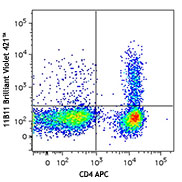
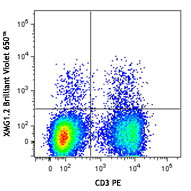
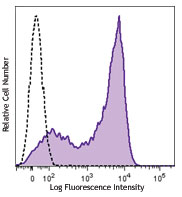
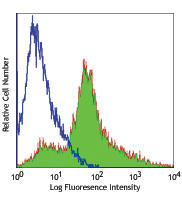



Follow Us